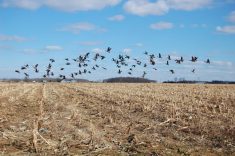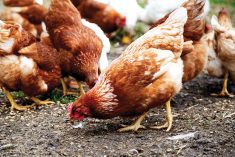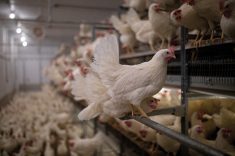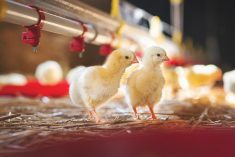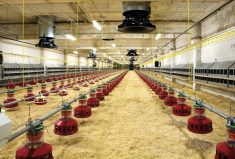The City of Winnipeg is reconsidering its ban on chickens in city limits — something proponents say will let people raise food and will regulate urban flocks already in clandestine backyard coops.
“I believe it’s a right and it’s an easy thing that we can put in place that can help foster food sovereignty,” said Louise May who is representing pro-poultry folks to city officials.
In January, the city’s Standing Policy Committee on Protection, Community Services and Parks asked Animal Services to review the topic as part of its review of the Responsible Pet Ownership bylaw, a city spokesperson said in a Feb. 9 statement to the Co-operator.
Read Also
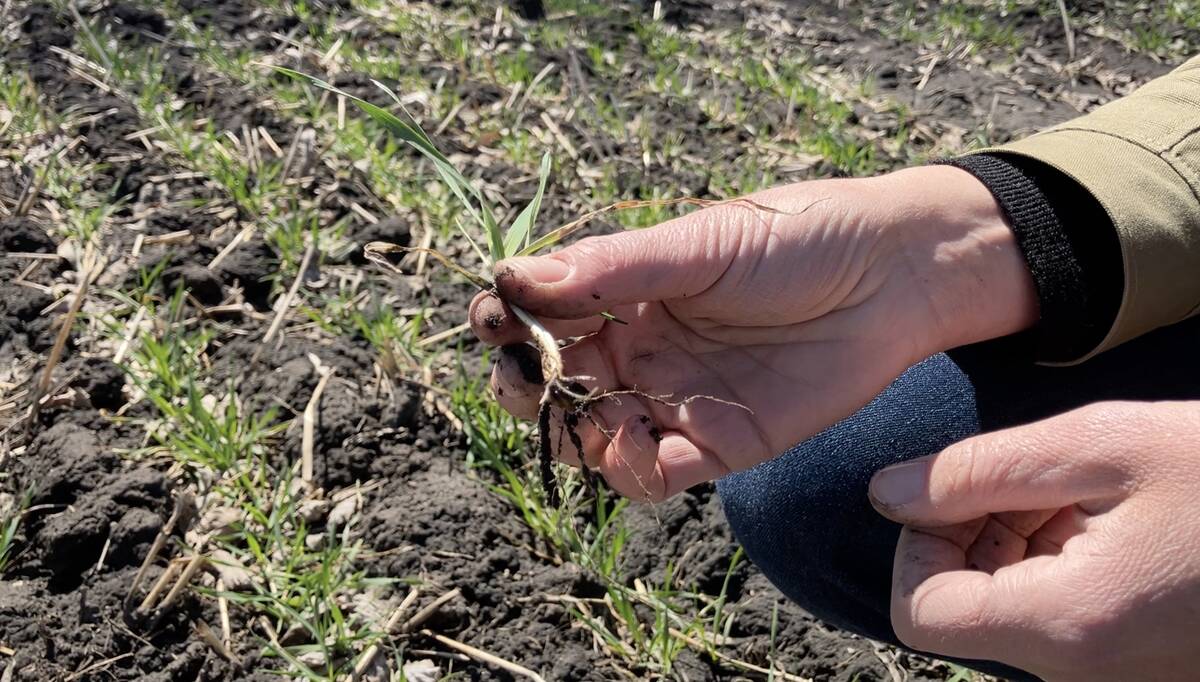
Manitoba farmers wary of research hit after AAFC cuts
Agriculture and Agri-Food Canada cuts claim Portage la Prairie research farm; Manitoba farms groups wrestle with potential impact.
The current bylaw bans chickens on land not zoned agricultural.
Model already in place
May raises chickens and other animals in St. Norbert. The land is zoned agriculture, but she required a conditional use permit to start her flock, May said. She also sells chicks and has hosted workshops on raising the birds.
She was part of efforts to get urban chickens legalized in 2012, the last time the city reviewed the topic as part of the group Chickens for WinnipEGGers (C4W). May told the Co-operator a city official contacted her and asked her to represent poultry proponents again.
They want to see Winnipeg implement a system similar to that of Edmonton and other cities that have allowed urban flocks, May said.
“There’s a pretty standardized model for how to have backyard chickens in cities,” she said. “It’s beyond the time when the City of Winnipeg should be implementing it.”
Edmonton’s system requires residents to apply for a licence to raise chickens. This includes taking an urban hen-keeping course, notifying neighbours, registering poultry into a provincial database, and also applying for an urban garden permit and a residential electrical permit if they plan to hard-wire electrical into their coop.
They may keep up to six hens — roosters are banned — that are no younger than 16 weeks. The hens must stay in their coop or enclosed run, and there are site requirements like backyard fencing, and minimum distances from property lines.
This system covers most objections May has heard — for instance, noise from roosters.
She added that there already are clandestine urban chicken flocks. If there was an outbreak of avian disease, the city and province currently have no way of pinpointing flock locations.
The city met with delegations from Edmonton and Toronto, which also have an urban chicken program, along with May, Cory Rybuck of Manitoba Egg Farmers, and other stakeholders on February 4.
Rybuck said since there’s no commercial egg farms in Winnipeg, the topic is an urban matter. However, Manitoba Egg Farmers reiterated to city officials what potential poultry owners need to consider.
A list Manitoba Egg Farmers sent to the Co-operator includes points such as:
- Laying hens require specialized food not available in most pet stores, and its high calcium content may be toxic to cats and dogs.
- Hens can be carriers of diseases like avian influenza and salmonella. Rybuck said they’re not overly concerned these will be carried onto egg farms, but owners need to know how to protect themselves.
- Chickens need appropriate protection from the elements and predators.
- Chicken manure can’t be composted due to high minerals, especially phosphorus.
Food sovereignty issue?
Backyard chickens as a means to local food should be discussed, said Councillor Brian Mayes, who heads the Winnipeg Food Council.
“As a group that’s trying to promote local food production and marketing and consumption… I think this is topical. This is part of that debate,” he said.
Mayes was on Winnipeg’s city council last time the topic came up. He told the Co-operator he’d voted against it.
“I’m inclined to not vote for it (again), to be blunt,” he said, “but I’ve got an open mind and you know, there are some issues where over a 10-year span people’s thinking changes.”
In 2012, city staff were cool to the idea because of animal welfare concerns, along with issues of noise and cleanliness, Mayes said.
With the pandemic on people’s minds, the desire for local food might be superseded by disease concerns, he said. They also need to consider if the people with the time and energy for a backyard flock are the ones who need help with food security, he added.
However, the pandemic has made people more aware of food security issues, he said.
Last year, the city council amended bylaws to promote urban agriculture, citing growing demand for local food.
“Growing food in urban areas increases food security, reduces carbon emissions, and provides opportunities for social interaction and community cohesion,” the city’s website says.
Social and community concerns are where the discussion should start, May said. Tending a garden and chickens gets people outside and gives them something to do with their kids, she said.
“There’s a much bigger picture right now when we’re looking at how we can transform our society to actually be healthy, and fair, and just,” she said. “This is just a simple tool that to me is absolutely necessary in a whole range of tools.”
Mayes said he expects city council to vote on the matter before the end of its term, which is in September.




